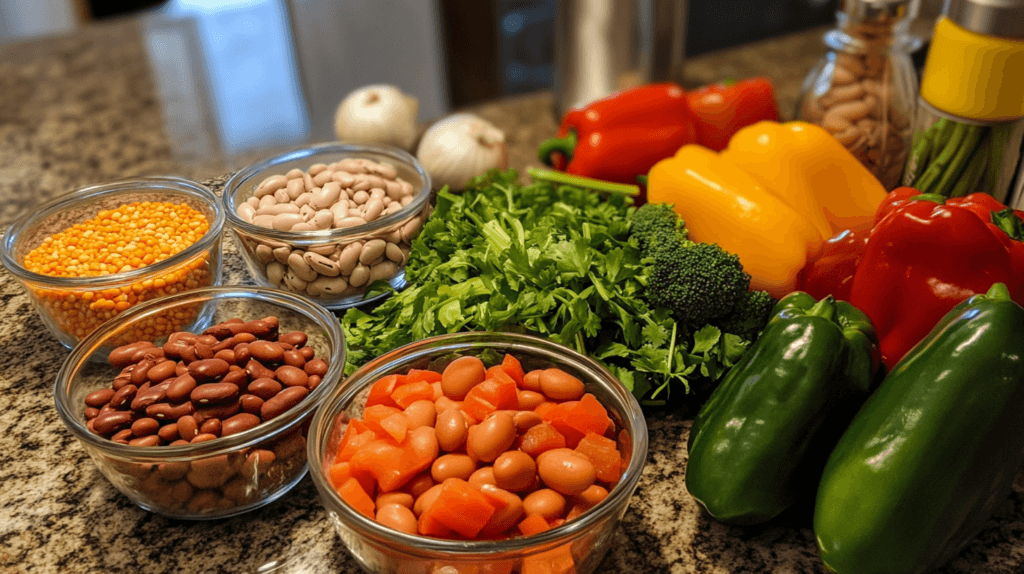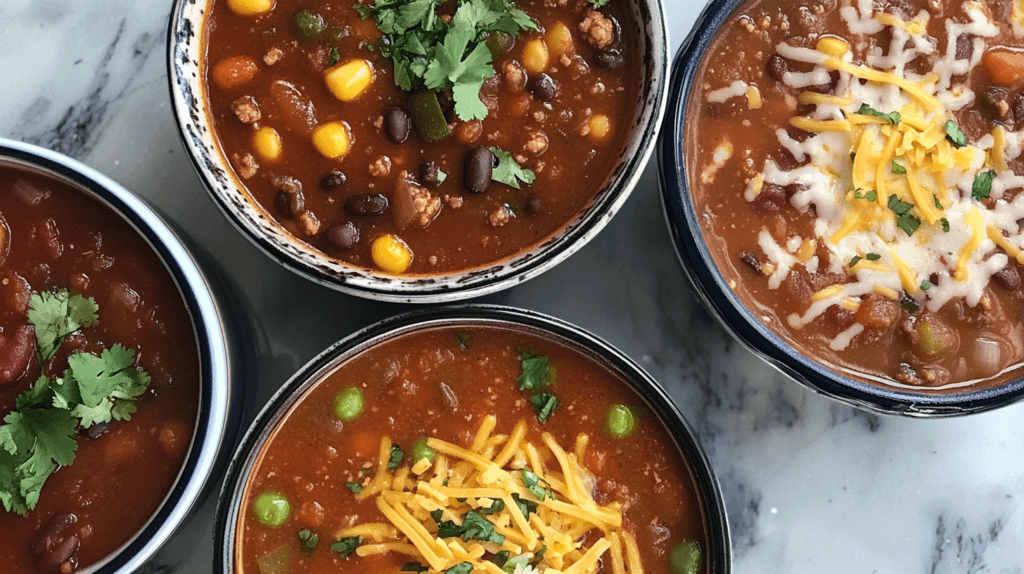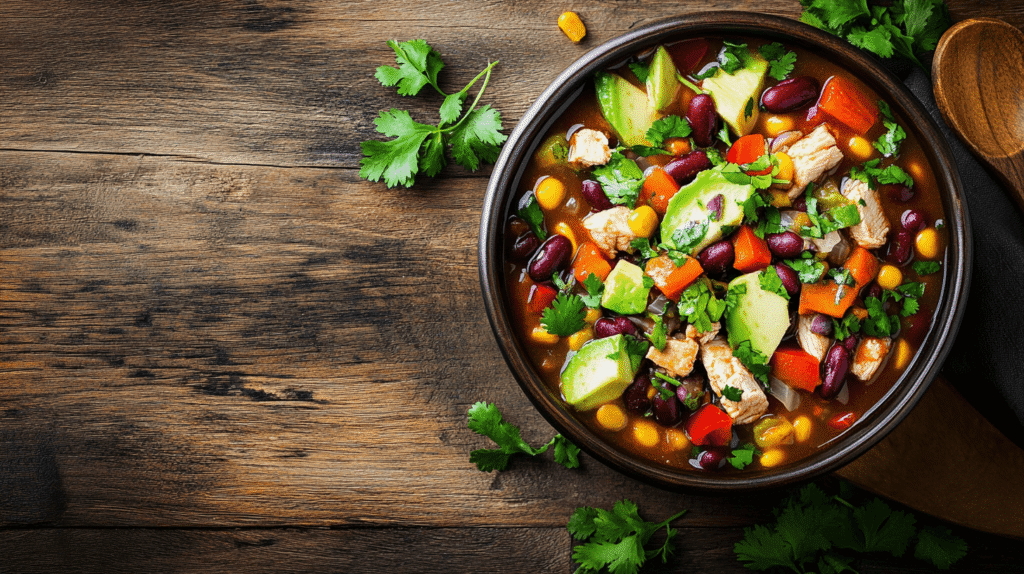Is taco soup unhealthy? This is a common question for anyone who enjoys this flavorful, hearty dish but is mindful of their dietary choices. Taco soup, with its combination of proteins, vegetables, and spices, can be both a comforting meal and a source of nutrients. However, depending on the recipe, it may also include ingredients that raise health concerns, like high sodium or saturated fats. In this article, we’ll explore whether taco soup is truly unhealthy and provide tips to make it a wholesome, guilt-free option for your meals.
Table of Contents
What Is Taco Soup?
It is a Mexican-inspired dish that merges the flavors of tacos with the simplicity of a soup. Typically, it includes ground beef or chicken, beans, corn, tomatoes, and a mix of spices such as cumin, chili powder, and garlic. The dish is often served with toppings like shredded cheese, sour cream, avocado, and tortilla chips.
Origin and Popularity of Taco Soup
It is a quintessential example of Tex-Mex cuisine, blending traditional Mexican flavors with American cooking styles. While its exact origins are difficult to trace, it is widely believed to have emerged in the southwestern United States, a region known for its rich fusion of Mexican and American culinary traditions.
The dish gained popularity because of its simplicity and versatility. Early recipes likely evolved from Mexican soups like pozole or caldo de res, but with an American twist, incorporating ingredients like canned beans, ground beef, and packaged taco seasonings for convenience. Over time, the dish became a favorite for busy families, thanks to its one-pot preparation and ability to feed a crowd.
Today, taco soup is celebrated across the United States and beyond. It frequently appears at potlucks, family dinners, and even in meal-prep plans. Its adaptability makes it appealing to a wide range of dietary preferences, with countless variations to suit low-carb, vegan, or gluten-free lifestyles. The rise of social media and food blogs has further propelled its popularity, as home cooks share creative and visually appealing takes on this comforting classic.
It rise to fame is also tied to its ability to evoke nostalgia while remaining practical. It’s a dish that many people associate with home-cooked meals and cozy evenings, making it not just a recipe but a comforting tradition in many households.
Nutritional Overview of Taco Soup

Taco soup’s healthiness largely depends on its ingredients and portion sizes. Let’s take a closer look at what typically goes into this dish and how it contributes to its nutritional value.
Typical Ingredients in Taco Soup
Protein Sources
- Ground Beef: A common choice but can be high in saturated fat.
- Chicken: Leaner and lower in fat, making it a healthier option.
- Beans: Black beans or kidney beans provide plant-based protein and fiber.
Vegetables and Spices
- Corn, Tomatoes, Onions, and Peppers: These add vitamins, minerals, and antioxidants.
- Spices: Cumin, chili powder, and garlic enhance flavor without adding calories.
Base Options
- Broth-Based: Lower in calories and fat, ideal for lighter versions.
- Cream-Based: Richer in flavor but higher in saturated fats and calories.
Calories in a Standard Serving of Taco Soup
On average, a one-cup serving of taco soup contains 150–300 calories, depending on the protein, base, and toppings used. Additions like cheese, sour cream, and tortilla chips can significantly increase calorie counts.
Macronutrients: Protein, Fat, and Carbs
- Protein: A serving typically provides 10–20 grams of protein, essential for muscle health.
- Fat: Saturated fat content varies based on meat and dairy choices.
- Carbohydrates: Ingredients like beans, corn, and tortilla chips contribute to the carb count, providing energy.
Health Concerns Related to Taco Soup
While taco soup can be a nutritious choice, certain aspects of its ingredients and preparation may raise health concerns. Let’s explore some potential pitfalls to consider.
High Sodium Content: Is It a Problem?
One of the most common concerns with taco soup is its sodium content. Many recipes rely on canned beans, tomatoes, and prepackaged seasoning mixes, which can be high in salt. Excess sodium consumption may contribute to high blood pressure, heart disease, and water retention.
Solution: Opt for low-sodium canned goods or make your own seasoning blend to control salt levels.
Saturated Fats in Meat and Dairy
If you use fatty ground beef, cheese, or sour cream, the saturated fat content in taco soup can spike. Diets high in saturated fats have been linked to an increased risk of heart disease and high cholesterol.
Solution: Use lean proteins like ground turkey or chicken, and opt for low-fat or plant-based dairy alternatives.
Potential Additives and Preservatives
Canned and prepackaged ingredients often contain preservatives and artificial additives. Over time, excessive consumption of these may have adverse effects on overall health.
Solution: Whenever possible, choose fresh or minimally processed ingredients for your taco soup.
The Health Benefits of Taco Soup
Taco soup is not only delicious and versatile but also packed with a variety of nutrients when prepared thoughtfully. From providing essential vitamins and minerals to promoting digestion and satiety, this Tex-Mex favorite can be a surprisingly healthy addition to your diet. Here’s a closer look at the many health benefits taco soup can offer.
Rich in Nutrients: Vitamins and Minerals
The base ingredients of taco soup—such as tomatoes, onions, peppers, and corn—are loaded with essential vitamins and minerals.
- Tomatoes are a rich source of vitamin C and potassium, which support immune health and maintain proper heart function. They’re also high in lycopene, an antioxidant linked to reduced risks of certain cancers and heart diseases.
- Bell peppers and onions provide vitamin A, vitamin C, and B vitamins, which are essential for eye health, immune function, and energy production.
- Corn is a good source of magnesium, a mineral that supports muscle and nerve function.
When you include fresh ingredients and avoid processed options, the nutritional value of taco soup increases significantly.
High Protein Content for Muscle Health
Protein is a major component of taco soup, especially if you include lean meats, beans, or plant-based protein sources. Protein plays a crucial role in maintaining and repairing body tissues, supporting immune functions, and preserving muscle mass.
- Animal proteins such as lean ground beef, turkey, or chicken deliver high-quality protein and essential amino acids.
- Plant-based proteins like black beans, kidney beans, or lentils provide protein along with dietary fiber, making them an excellent choice for vegetarians or anyone seeking a lower-fat option.
This high protein content makes taco soup an ideal choice for athletes, growing children, or anyone looking to maintain a healthy, active lifestyle.
Fiber from Vegetables and Legumes
Legumes like beans and vegetables such as corn and peppers are excellent sources of dietary fiber, a nutrient many people don’t get enough of in their daily diets.
Satiety and Weight Management: High-fiber meals like taco soup keep you feeling full longer, which can help prevent overeating and support weight management goals.
Fiber’s Role in Digestion: Fiber promotes healthy digestion by adding bulk to stool and supporting regular bowel movements.
Blood Sugar Regulation: The fiber in taco soup helps stabilize blood sugar levels by slowing down the absorption of sugar into the bloodstream.
How to Make Taco Soup Healthier
By making a few smart adjustments, you can transform taco soup into a health-conscious dish without sacrificing flavor.
Choosing Lean Proteins
Switching from fatty ground beef to ground turkey, chicken, or even plant-based proteins like lentils can significantly reduce the fat content.
Reducing Sodium and Fat Levels
- Sodium Reduction: Use unsalted or low-sodium broth and canned goods.
- Fat Reduction: Replace heavy cream with Greek yogurt or omit dairy altogether.
Using Fresh Ingredients
Fresh vegetables, homemade broth, and a spice mix free of preservatives enhance flavor while keeping the soup wholesome. Plus, fresh ingredients often have a higher nutrient content compared to processed options.
Comparing Taco Soup with Other Soups

How does taco soup stack up against other popular soups? Let’s compare:
Taco Soup vs. Chili
Both dishes are hearty and flavorful, but chili often contains more meat and is heavier in calories. Taco soup, with its higher vegetable content, can be a lighter alternative.
Taco Soup vs. Cream-Based Soups
Compared to soups like clam chowder or creamy potato soup, taco soup is generally lower in saturated fats and calories, especially if you opt for a broth-based version.
Taco Soup vs. Vegetable Soups
Vegetable soups are often the lowest in calories and fats, but they may lack the protein content of taco soup. Adding beans or lean meat to vegetable soup can help balance the nutritional profile.
Expert Opinions on Taco Soup and Diets
When it comes to taco soup, nutritionists and dietitians agree that its healthiness largely depends on how it’s prepared and consumed. Here are some expert insights:
Dietitian Insights: Balancing Flavors and Nutrition
Dietitians emphasize the importance of balance in taco soup recipes. By incorporating lean proteins, plenty of vegetables, and minimal processed ingredients, you can enjoy a flavorful meal that aligns with a healthy diet. They recommend using herbs and spices for flavor instead of relying on salt-heavy seasoning blends.
Popular Diet Trends and Taco Soup
- Keto Diet: Taco soup can be keto-friendly if you eliminate high-carb ingredients like beans and corn and use full-fat dairy.
- Vegan Diet: Substituting meat with plant-based proteins like tofu, lentils, or additional beans creates a nutritious vegan version.
- Weight Loss Diets: By focusing on low-calorie ingredients and skipping high-fat toppings, taco soup can be a filling and low-calorie option.
Frequently Asked Questions About Taco Soup
Is Taco Soup Good for Weight Loss?
Yes, taco soup can be part of a weight-loss diet if it’s made with lean proteins, plenty of vegetables, and minimal high-calorie toppings. Its high fiber and protein content promote satiety, reducing the likelihood of overeating. Pair it with other low-calorie dishes from our 15 Perfect Pairings for Tacos to create a balanced meal.
Can It Be Part of a Low-Carb Diet?
Absolutely! For a low-carb version, skip starchy ingredients like beans and corn. Replace them with low-carb vegetables such as zucchini or cauliflower. For more creative serving ideas, check out How to Make Taco Bowls with Mold.
Are Canned Ingredients Healthy for Taco Soup?
Canned beans, tomatoes, and corn are convenient but may contain added sodium and preservatives. Choosing low-sodium or organic options can make them a healthier choice. Explore how to use similar ingredients in Dutch Oven Recipes: Ultimate Guide to Soups, Bread, & More.
How to Reduce Calories in Taco Soup?
To reduce calories:
- Use leaner proteins like chicken or turkey.
- Replace sour cream with Greek yogurt.
- Skip calorie-dense toppings like shredded cheese and tortilla chips.
What Are the Healthiest Toppings for Taco Soup?
Opt for nutrient-rich toppings like avocado slices, fresh cilantro, lime juice, and a small sprinkle of low-fat cheese. These add flavor and nutrients without excessive calories.
Can Vegetarians Enjoy a Healthy Taco Soup Version?
Yes! Vegetarians can use a mix of beans, lentils, or meat substitutes like textured vegetable protein. Adding extra vegetables and spices enhances flavor and nutrition.
Conclusion: Is Taco Soup Unhealthy?
So, is taco soup unhealthy? The answer lies in how it’s prepared. While traditional recipes with high-fat meats, cheese, and salty seasonings can tip the scales toward unhealthy, healthier versions of taco soup can be both delicious and nutritious. By focusing on fresh ingredients, lean proteins, and balanced portions, you can enjoy this Tex-Mex favorite guilt-free. For more culinary inspiration, consider experimenting with creative taco bowl presentations or learning new techniques through our Dutch oven recipes.

